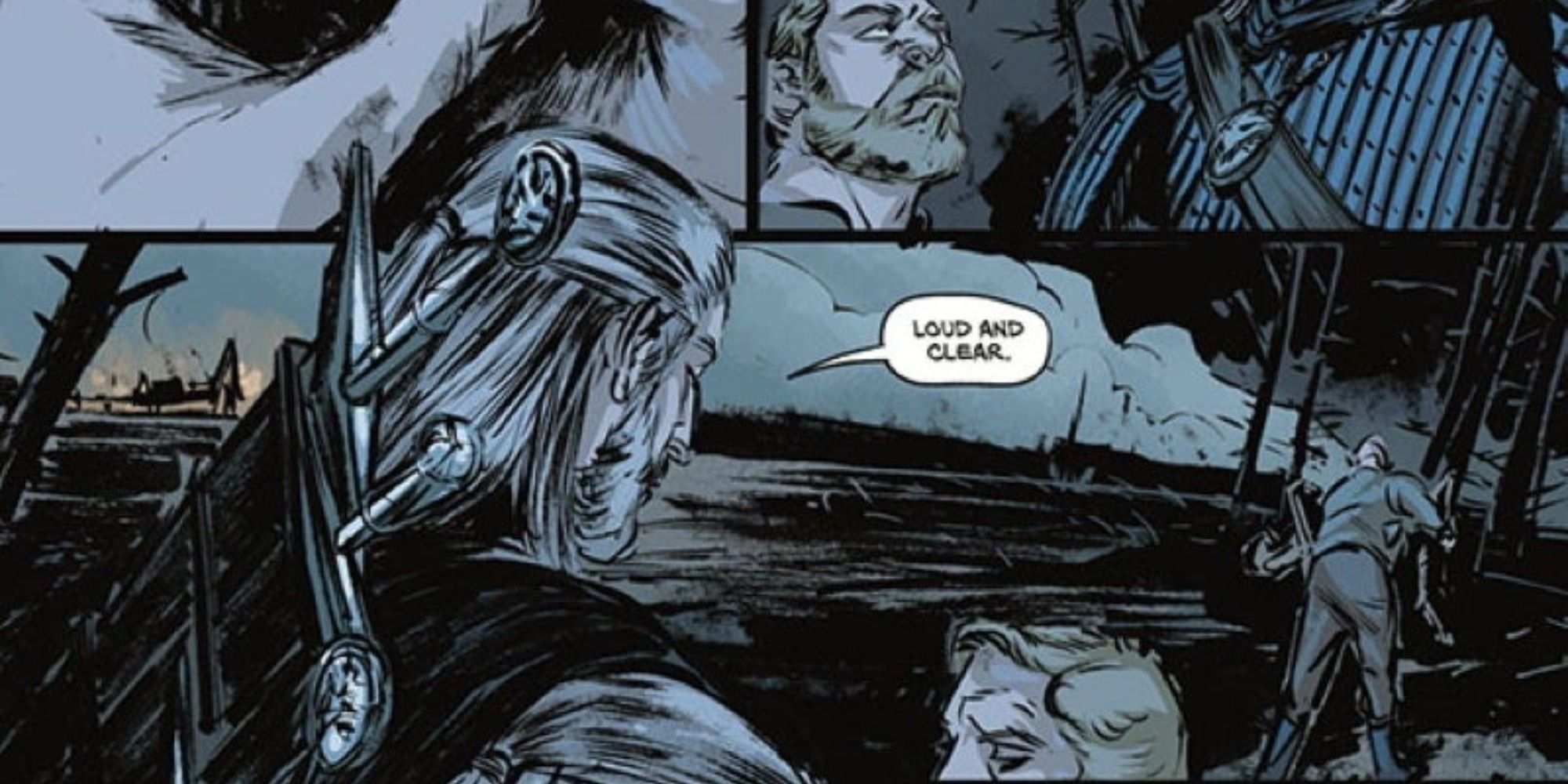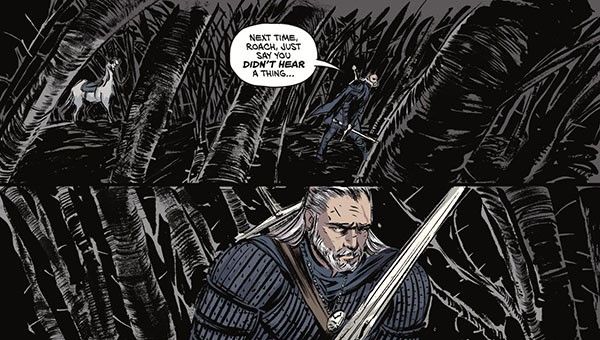Geralt of Rivia is, for the most part, a pretty likeable guy. The monster slayer often refuses payment on some kind of self-prescribed moral grounds, devotes all of his time and energy to raising his surrogate daughter, and is pretty chill with supposed “monsters” - provided they’re not doing anything actively monstrous. The latest issue of The Witcher: Witch’s Lament, however, features a very different Geralt to the one fans might be accustomed to - essentially, he’s a bit of a Lambert (a prick).
It’s an understandable kind of prickishness, mind. Geralt is tasked with hunting down a laima, a witch who is predominantly associated with expectant mothers. While a laima’s powers can be varied, this particular witch possessed five different women and vicariously killed five men through them, which is why Geralt was commissioned in the first place. While he doesn’t kill the laima himself, he feels guilty on account of having set her death in stone - he may not have swung the sword, but he was the one who put it in the executioner’s hand (or, in this instance, built the pyre).
All of the above transpires in the first comic, which came out last month. The issue ends after Geralt arrives at what is presumably the lair of a small coven of witches, who we now know are named Milda and Zemyna. He’s here to save Giltine, the daughter of a local noble, although she has no interest in leaving with him - she hasn’t finished her cycle of grief yet, which is exactly what Milda and Zemyna are supposedly helping her with. This cycle is composed of five distinct phases: Exordium, which refers to the recognition of pain; Laudatio, which is concerned with deciphering pain’s true cause; Comploratio, which is the mourning phase; Consolatio, which, as the name might imply, triggers the first steps of consolation; and Exhortatio, described in the comic as the “moral admonishment which ends the lament.” Giltine is fairly far along by the time Geralt arrives, although in Geralt’s eyes the entire ordeal revolves around a maelstrom of mumbo-jumbo.
That sums up what I mean when I say that this comic is depicting a side of Geralt we rarely see elsewhere. While he’s a bit more gruff in Sapkowski’s books than he is in CD Projekt Red’s games, he’s still far more kind-hearted than cold - just think of The Lesser Evil from The Last Wish or Netflix’s Witcher series, where he kills Renfri and her men before they destroy a whole village to get back at Stregobor. He might make questionable decisions or be occasionally rude, but he’s never obnoxious or aggressive without cause. In this new comic series, he tells everyone and their gran to fuck off every ten seconds. Simply put, he doesn’t seem to give two shits about the people he’s saving, and, in stark contrast to the character established in other media, he has a weird fixation on getting paid. I mean, I know that would be normal for most people, but it always seems to be a kind of bonus - or an afterthought, at the very least - for the Geralt I’ve become accustomed to over the last decade. I’ve read everything, played everything, and watched everything - I’m not exaggerating when I say this is a Geralt we’ve never seen before.
And that’s admittedly why it feels weird for me to see him like this now. I know he’s a fictional character, but I’ve devoted well over a thousand hours to this universe. I’d like to think I’ve learned a lot from its characters and stories, which is something I wouldn’t say lightly - I studied English Literature and read all the Classics, and I’m 100 percent confident in my stance that books like Wuthering Heights aren’t fit to wipe shite off a dog’s arse. The Witcher is different - it tells raw, heartfelt stories that aren’t just grimdark or miserable. They’re warm, witty, and whimsical in ways that even comedy can’t quite capture, because The Witcher is specifically designed with tragicomedy - the best mode of storytelling - in mind. There’s no comedy in these new pages - none of the warmth, wit, and whimsy this series has become so universally revered for. It’s not bad - as a matter of fact, the comics have been really good so far - but it’s definitely odd to see such a different spin on Geralt after so many different forms of media appeared to have unanimously decided on a concrete, unwavering idea of who he is, and what he stands for.
Don’t get me wrong, I’ll read the third issue when it launches on July 28, and I have full faith in the fact it’s going to be really good - I’m just not sure how much I like seeing this specific version of Geralt. There’s a difference between video game Geralt saying “C’mon, Roach!” and comic book Geralt asking his horse about whether or not it feels haunted. Henry Cavill saying “Fuck!” isn’t quite the same as comic book Geralt repeatedly telling innocent strangers to fuck off. Sapkowski’s legendary witcher rescuing someone from the clutches of a drowner mob isn’t comparable to comic book Geralt only picking someone up from the dirt because they look rich and he reckons he’s in for a pay day.
The Witcher: Witcher’s Lament puts an intriguing spin on one of my favourite characters of all time, and I’m fascinated by where it might go in the issues to come - who knows, maybe this whole thing has some deeper meaning about Geralt rationalizing the kindness we know him for in a world largely devoid of it. All I’m saying is that I don’t think I like this Geralt very much - at least not what we’ve seen of him so far - and that when the comic run ends, I’ll probably boot up The Witcher 3 or take Blood of Elves out the back garden so I can remind myself of what the real Geralt is like. I’m not sure he would have taken in the laima without hearing her out, and I know for a fact he wouldn’t try to force Giltine to leave Milda and Zemyna without making a conscious effort to understand her situation first. I don’t know, it’s just weird - I hope issue three can at least partially explain what’s going on with the White Wolf.


